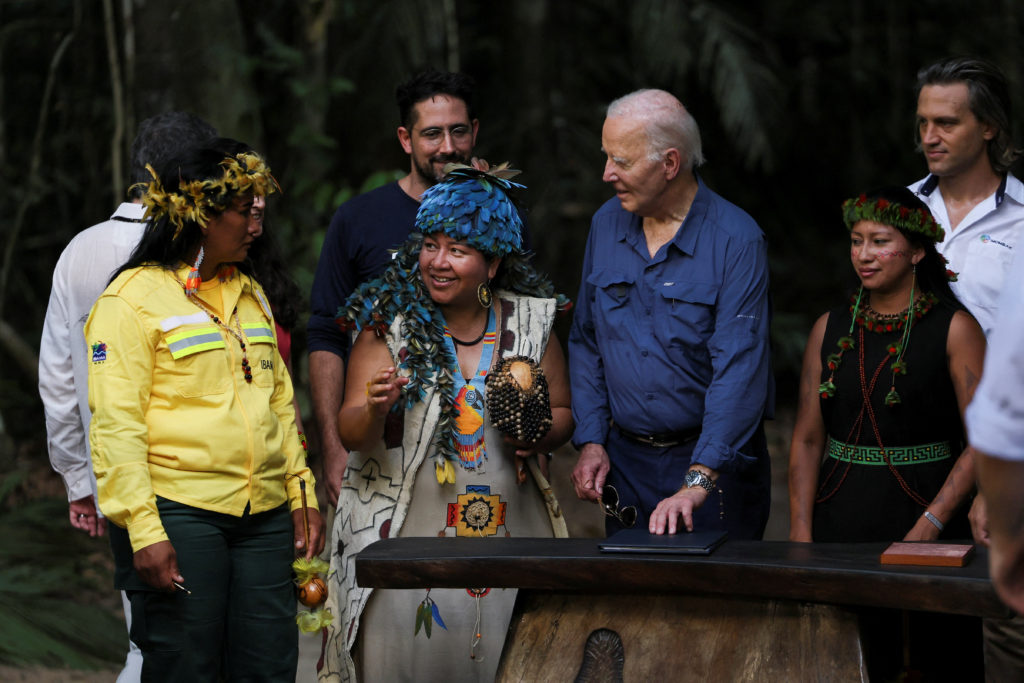President Joe Biden’s historic visit to the Brazilian Amazon on Sunday marked the first time a sitting U.S. president has ever stepped foot in the region, underscoring his administration’s commitment to tackling climate change. With the looming threat of a new Trump administration, Biden sought to highlight the importance of preserving the Amazon and the global fight against global warming. However, his visit was also overshadowed by concerns about the potential rollback of climate policies under a future Republican president.
Standing amidst the lush backdrop of the Amazon rainforest, Biden called the battle against climate change a “defining” issue of his presidency. He emphasized the critical role the Amazon plays in the global effort to curb carbon emissions, with its vast forests serving as a vital carbon sink. Biden’s trip to the region was an opportunity to underscore the U.S. government’s efforts to reduce carbon output and support international climate action, marking the significance of the Amazon as both a natural wonder and a key player in the fight against climate change.
However, Biden’s message carried a pointed warning to future administrations, particularly to the incoming Trump administration, which has a history of climate skepticism. While Biden did not explicitly name Donald Trump, who has previously questioned the existence of climate change and vowed to undo many of Biden’s environmental policies, his remarks made it clear that he views climate action as a long-term, irreversible trend. “I will leave my successor and my country a strong foundation to build on if they choose to do so,” Biden said. “It’s true, some may seek to deny or delay the clean energy revolution that’s underway in America. But nobody, nobody can reverse it.”
Biden’s statement was a direct challenge to those who may seek to roll back his climate achievements, stressing that the clean energy revolution, with its growing momentum, cannot be undone. He pointed to the broad support for clean energy in the U.S. and globally, suggesting that the future of energy is already shifting toward sustainability, and nations must decide whether to embrace this change or resist it.
During his visit, Biden took an aerial tour of the Amazon, where he witnessed firsthand the damage caused by severe droughts, including dried-up riverbeds and the devastation wrought by wildfires. This half-hour tour, conducted aboard Marine One, took Biden over the confluence of the Rio Negro and Amazon rivers, where he saw ships stranded due to low water levels. The tour highlighted the urgent need for climate resilience in the region, which is grappling with the dual threats of deforestation and extreme weather events.
As part of his visit, Biden announced several new initiatives aimed at protecting the Amazon and supporting countries facing the effects of climate change. This included tens of millions of U.S. dollars for conservation efforts in the Amazon and pledges of billions in funding for nations working to strengthen their resilience to climate-related challenges. The U.S. has long recognized the Amazon’s critical role in global climate stability, with its forests acting as a carbon sponge, absorbing vast amounts of CO2 and helping mitigate the effects of global warming.
However, Biden’s pledges were made against the backdrop of uncertainty. The incoming Trump administration, which has been critical of climate change initiatives, poses a significant threat to the continuity of these efforts. Trump has repeatedly dismissed the science of climate change, and during his presidency, he pulled the U.S. out of the Paris Climate Agreement—an accord Biden rejoined upon taking office. Trump’s team has already indicated plans to ease environmental restrictions on fossil fuel exploration, particularly oil and gas, which Biden had tightened during his time in office. Furthermore, Trump has expressed skepticism toward foreign climate aid, which raises questions about the long-term impact of Biden’s climate commitments.
World leaders attending climate summits in South America this month have expressed doubts about the permanence of Biden’s climate initiatives, especially with the imminent transition to a new administration. The Amazon’s fate—and by extension, the planet’s climate future—now hangs in the balance as political shifts threaten the stability of international climate cooperation.
The stakes for the Amazon are higher than ever. In addition to its vital role in absorbing carbon emissions, the rainforest is home to an unparalleled array of biodiversity and Indigenous communities whose livelihoods depend on its preservation. Biden’s visit served as a call to action, both for the U.S. and the world, to recognize the Amazon’s importance in combating climate change. But with the future of climate policy uncertain, the coming years will determine whether the efforts to protect the Amazon—and the broader global climate initiatives—can withstand the challenges ahead.







